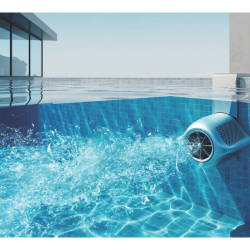Three of the Best Swimming Pool Heat Pumps
Swimming pool heat pumps are a great piece of kit if you're looking to be a bit more eco-friendly and cost-efficient when heating your pool! They offer numerous benefits and work harmoniously with other poolside equipment, such as solar covers!
Here at 1st Direct Pools, we stock a whole range of cost-efficient and eco-friendly swimming pool equipment, such as swimming pool heat pumps!
If you ever need advice or expertise relating to pools, contact a member of our team. Here at 1st Direct Pools, we are always happy to help our customers find the equipment they need for their pool, whether it’s chlorine tablets, heat pumps or a particular type of swimming pool cover.
What is the Most Energy Efficient Way to Heat a Swimming Pool?
If you're looking for an energy-efficient option when it comes to warming up your swimming pool, a swimming pool heat pump is the way to go!
Heat pumps are valuable investments when it comes to getting your pool ready for the swimming season. They work exceptionally well when combined with a solar pool cover or some solar rings.
As mentioned above, a heat pump is an energy-efficient option due to its mechanics. A heat pump works by harvesting the heat from the atmosphere, which is then magnified and transferred to the water.
The process is incredibly economical and much cheaper on an annual basis when compared to other heating methods. Although the initial price may put some off, it's worth noting that a heat pump is an investment and will pay for itself in the long term. You can get different kinds of heat pumps, including inverter heat pumps and standard on/off heat pumps – the former run at reduced/increased capacity according to the pool's heating needs, whereas the later can either be on or off and, when on, will run at 100% capacity only.
What is the Best Heat Pump for Swimming Pools?
If you're looking to invest in a heat pump, you'll probably be interested to know what the best ones on the market are!
Here at 1st Direct Pools, we have recommended three of our favourite heat pumps, each offering various benefits to you and your pool!
Aqua Inverter Turbo-Pro
This swimming pool heat pump took five years to develop, mainly due to its unique Turbo Silence Inverter. The silence control system is based on fully optimised full-inverter technology.
The heat pump itself has been designed to balance the inverter-compressor control with its heat exchange technology. Combining these features with its optimised silence control technology, and there’s no denying the Turbo performs beautifully.
You can use the heat pump for both indoor and outdoor pools, and it can also halve your running costs!
Other special features of the Aqua Inverter Turbo-Pro include:
- • 10-times quieter than regular heat pumps.
- • Modes include booster, smart and silent.
- • Double energy saving - COP up to 16.1.
- • Built-in Wi-Fi.
- • Operates at air temperatures from 15℃ - 43℃.
This heat pump also comes with a manufacturer's warranty:
- • Heat exchanger – 10 years
- • Compressor – 10 years
- •Parts – 3 years
Aqua Inverter Heat Pump
Aqua Inverter Heat Pumps have been designed with unique Full-Inverter Technology. They were made by Fairland, a hallmark leader in Heat Pump Inversion Technology.
Aqua Inverter Heat Pumps are full inversion; in other words, both the compressor and the fan can run at the optimum speed required, which includes a multi-speed fan. Other heat pumps will usually only be partially inverted, which will not give you the same performance.
A multi-speed fan allows the heat pump to adopt a variable behaviour that will enable it to meet the required needs of the pool. The compressor and fan can alter their power to work at 30%, 70% and 100%; this gives the heat pump its higher COP (Coefficient of Performance, indicating low energy consumption and running costs) and low sound level.
This heat pump also comes with a manufacturer's warranty:
- • Heat exchanger – 7 years
- • Compressor – 7 years
- • Casing – 2 years
- • Parts – 2 years
Inverter Comfortline
Our range of Inverter Comfortline's are saltwater safe and powered by DC inverter compressors. Depending on the different heating demands, they can adjust their heating capacity from 20% to 100%.
When the swimming season starts, you'll want to start heating your pool as much as possible; this will usually require your heat pump’s compressor and fan to work at a capacity of 100% for fast heating.
Once the desired temperature for your pool has been reached, the Inverter Comfortline can run at a slower speed to conserve energy, providing a higher COP.
Special features of the Inverter Comfortline include:
- • Easy-to-use to use control panel and informative user interface.
- • Silent mode for nighttime running.
- • Auto Defrost - allows the unit to be run down to 0 degrees.
- • Comes with a 1.5" female plain socket.
- • Salt Water Safe - up to 3.5% (35g in 1000g water)
- • Fully variable compressor and a stepped variable fan.
The Inverter Comfortline also comes with a competitive warranty.
What Size Heat Pump Do I Need for My Swimming Pool?
If you're committed to purchasing one of these incredible pieces of poolside equipment, then you'll need to know what size heat pump you'll need for your pool.
If this all sounds a little bit complicated, there's no need to worry; in our article below, we explain everything you need to know about calculating the perfect heat pump for your pool.
For more information about pools and essential pieces of kit, check out our blog, where we provide a great range of information on everything you need to know so that you can maintain a cost-efficient and clean swimming pool!
If we haven't managed to cover what you're looking for, contact a member of our team. Here at 1st Direct Pools, we're always happy to help!







